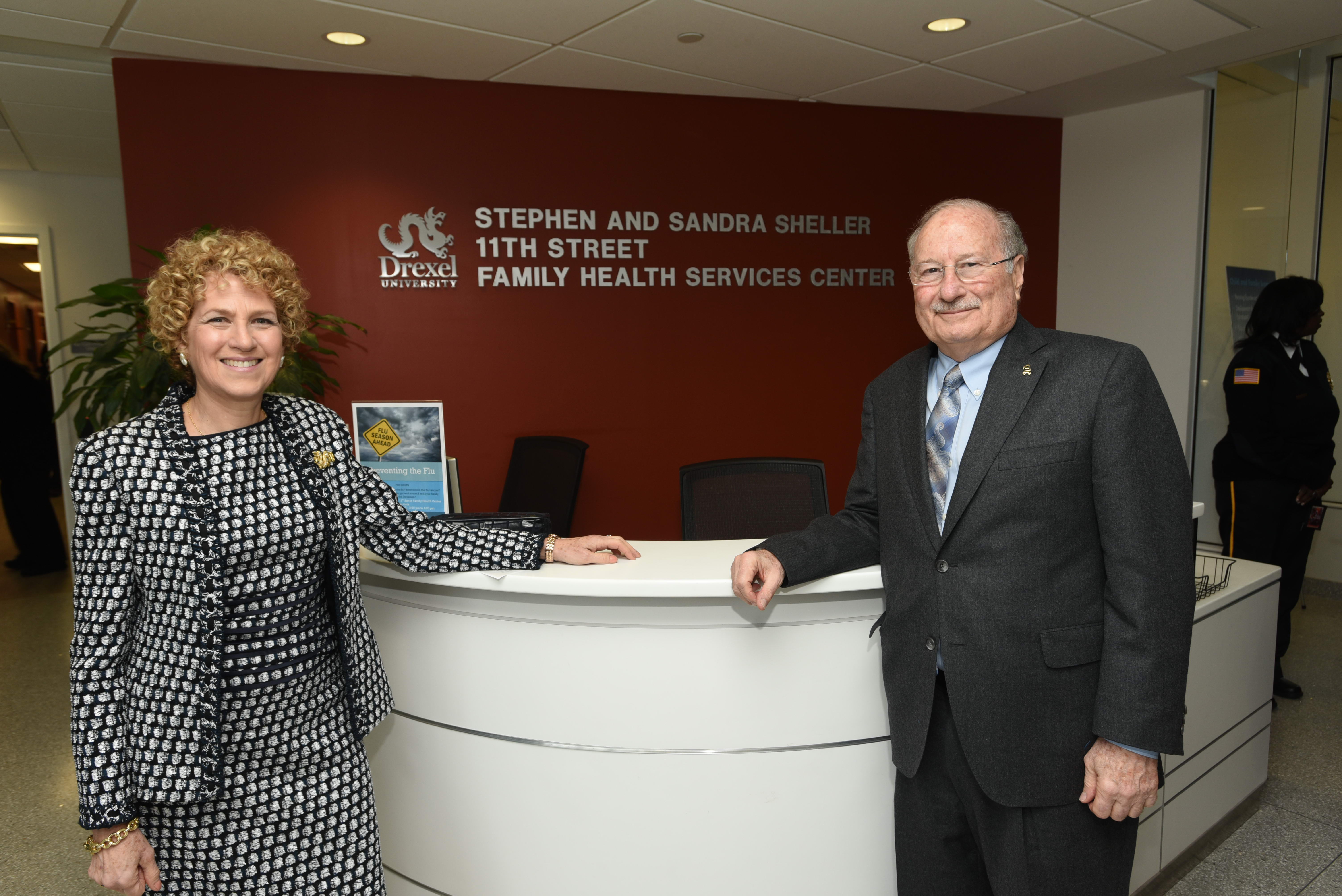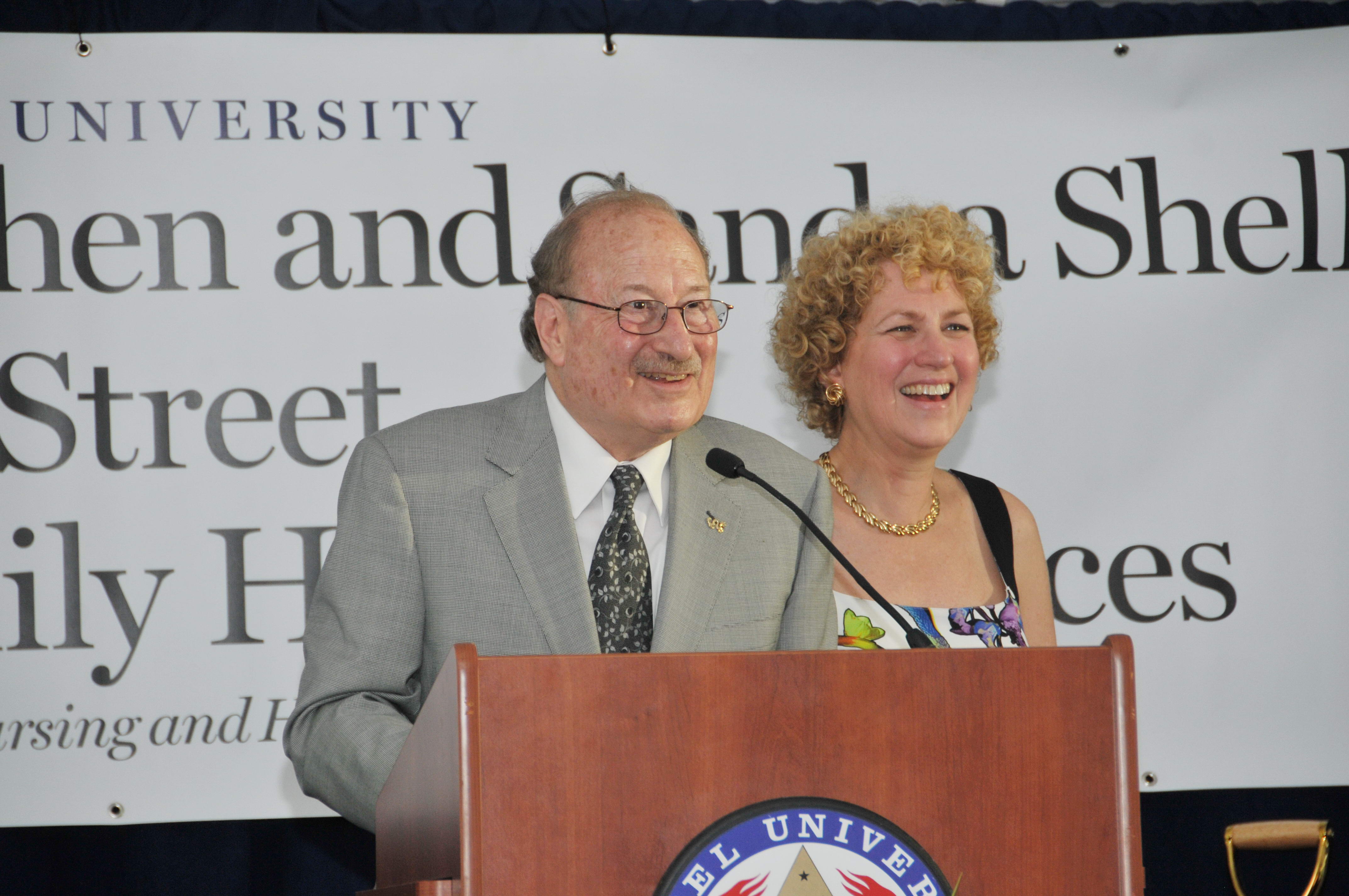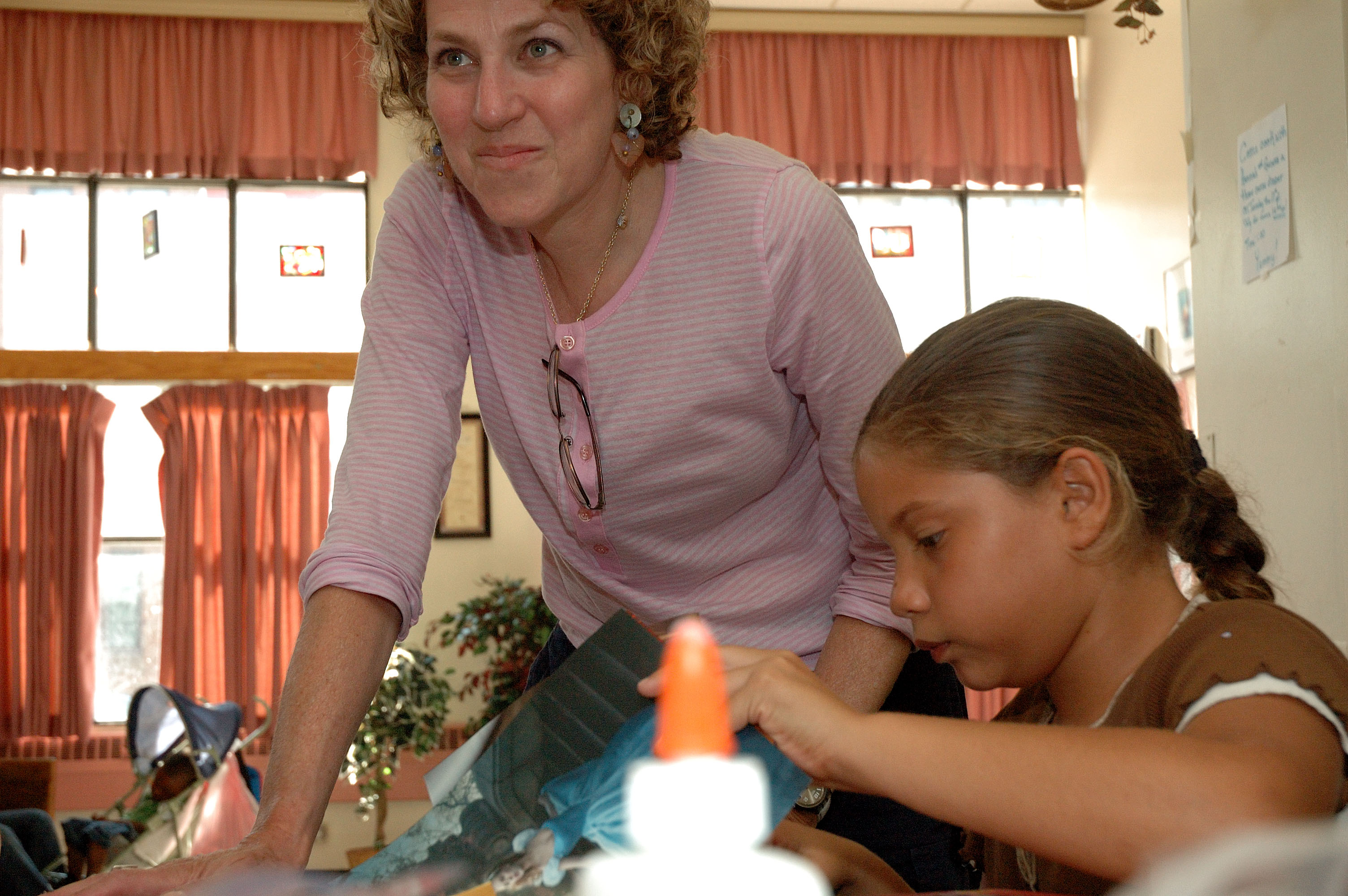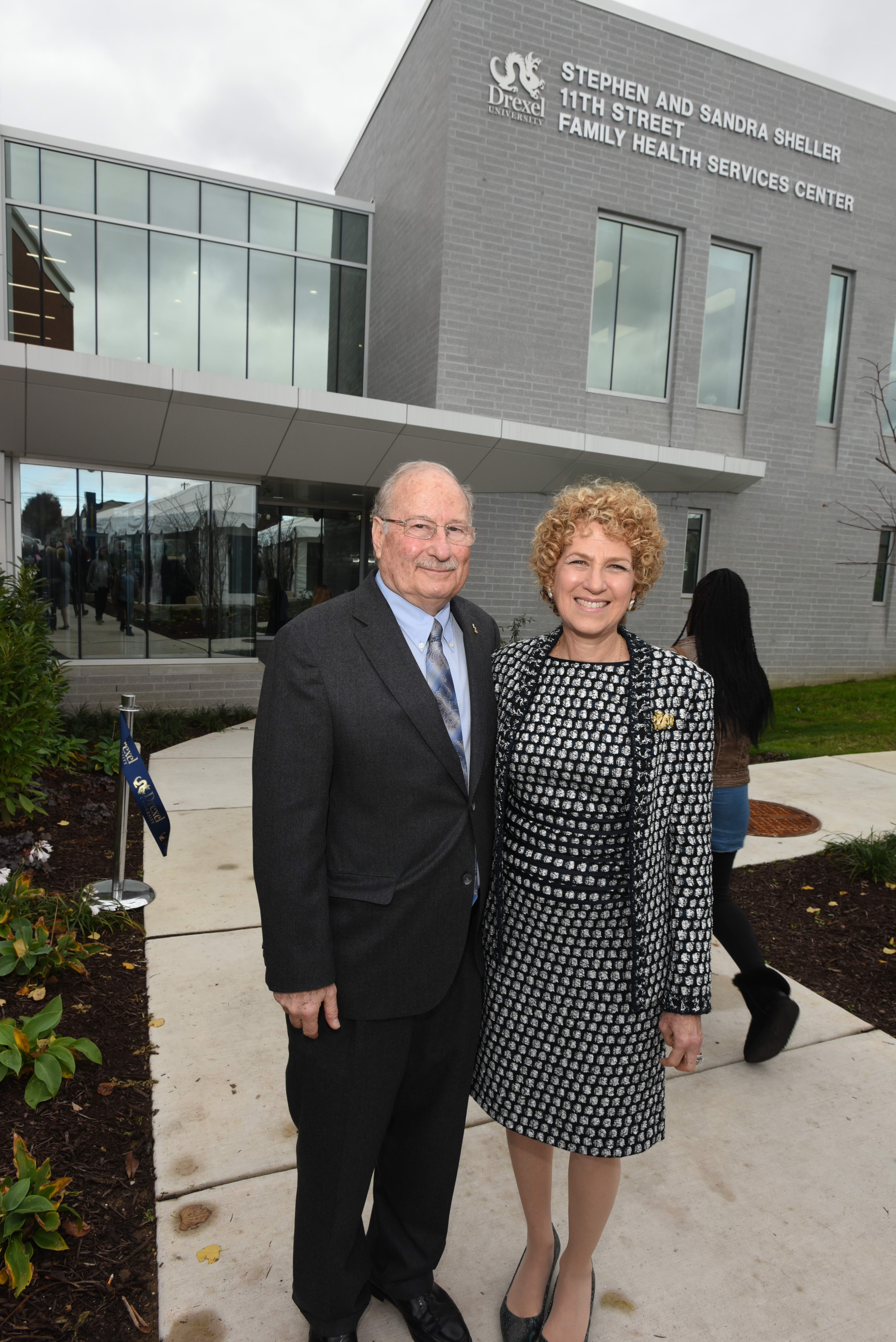Q&A with Sandy Sheller
February 1, 2024
 The Stephen and Sandra Sheller 11th Street Family Health Services of Drexel University (located in a high-poverty, underserved area of North Philadelphia) has provided state-of-the-art comprehensive, holistic, nurse-led health care to address the complex family and community health and social needs of its neighborhood’s residents since 1996. Over these last decades, as 11th Street has offered a vast array of services and programs to thousands of uninsured and underinsured patients, they have been able to expand to more adequately address what the community has said it wants and needs. Not only does this include primary and preventative care, social work and state-of-the-art dental, but it also includes a wide range of therapeutic care (with a focus on creative arts) and healthy living center programs (such as cooking, nutrition and physical therapy).
The Stephen and Sandra Sheller 11th Street Family Health Services of Drexel University (located in a high-poverty, underserved area of North Philadelphia) has provided state-of-the-art comprehensive, holistic, nurse-led health care to address the complex family and community health and social needs of its neighborhood’s residents since 1996. Over these last decades, as 11th Street has offered a vast array of services and programs to thousands of uninsured and underinsured patients, they have been able to expand to more adequately address what the community has said it wants and needs. Not only does this include primary and preventative care, social work and state-of-the-art dental, but it also includes a wide range of therapeutic care (with a focus on creative arts) and healthy living center programs (such as cooking, nutrition and physical therapy).
Sandy Sheller (Alumna ’04, ‘05) and her husband Stephen Sheller (Trustee Emeritus, HD ‘17) are an essential part of the growth at 11th Street. Sandy, as well as being an alumna, is a former assistant clinical professor at Drexel, an art therapist and currently president and director of the Sheller Family Foundation. The foundation’s mission is to improve lives, particularly of the marginalized and underserved, and it supports organizations that promote positive social change. In 2014, the Sheller Family Foundation helped support the expansion of 11th Street.
We asked Sandy to share more about what makes 11th Street unique and how she hopes to see it grow in the future.
Can you tell me about the mission of 11th Street?
 While the formal mission statement is to provide quality, comprehensive health services to the patients it serves, with special attention to vulnerable people and residents of the four surrounding public housing units in the 11th Street Corridor, 11th Street does much more. 11th Street provides seamless engagement for patients and caregivers in the full range of physical, psychological, social, preventive and therapeutic factors known to be necessary for the achievement of optimal health throughout the lifespan. They seek to serve not just immediate physical needs of a person, but to address the bio-psycho, social needs of each individual as a whole person, providing an innovative integrated health care model. They deliver patient-focused care using a trauma-informed team-based approach which helps to decrease health disparities and build community and patient trust.
While the formal mission statement is to provide quality, comprehensive health services to the patients it serves, with special attention to vulnerable people and residents of the four surrounding public housing units in the 11th Street Corridor, 11th Street does much more. 11th Street provides seamless engagement for patients and caregivers in the full range of physical, psychological, social, preventive and therapeutic factors known to be necessary for the achievement of optimal health throughout the lifespan. They seek to serve not just immediate physical needs of a person, but to address the bio-psycho, social needs of each individual as a whole person, providing an innovative integrated health care model. They deliver patient-focused care using a trauma-informed team-based approach which helps to decrease health disparities and build community and patient trust.
In addition to 11th Street’s direct services mission, 11th Street provides an exemplary model of nurse-managed, community-based transdisciplinary care for the education of health professions’ students and for faculty practice (internship, research and collaboration) as well as opportunities for intern practice for Drexel students in other disciplines such as business, law and IT. Because of the two-story expansion we helped fund increasing the space for education and clinical training, in fiscal year 2023 there were almost 60 Drexel student interns in a variety of disciplines, eight student interns from other surrounding institutions (such as Temple University School of Social Work, Walden University and John Hopkins School of Nursing) and a number of AmeriCorps volunteers.
What sets 11th Street apart from other health centers?
It is the understanding of what a community often riddled with adversity, trauma and multigenerational complex health and social disparities needs that sets 11th Street apart from other health centers. Patients are at the center of care, access to care is made easy, and care is provided holistically to the entire family starting with the development of a comprehensive treatment plan developed by an integrated team including a nurse practitioner, medical assistant, registered nurse, behavioral health consultant, child and family support coordinator and nutritionist. There is no wrong door to enter care. Someone could come for a workout class and then enter primary care, or children can come from a dental checkup and then the whole family could be seen for care in one of their large family rooms for a wellness check-up.
In addition, and what's very important because of the level of marginalization, trauma and racism these families have faced, is that there is an active community advisory board where the community weighs in and decides the kind of services they need and want to see offered. Examples of this through the years include establishing a community garden where teens are taught how to set up mini businesses to sell the produce grown or offering diabetic mapping classes to help patients engage in their own wellness and recovery. In addition to offering weekly boxes of free food through a program called Farms to Families, their nutritionist provides food samples and culturally appropriate recipes, so people know what to do with the fresh food they're receiving. There is an onsite pharmacy providing and delivering medication the same day at low costs, an onsite lab and a washer/dryer to help those who are unhoused. Provided are support groups for how you live well with chronic disease, stress reduction classes, fitness for all types of body needs, complementary therapies such as reflexology and yoga meditation, and the community has totally embraced creative arts therapies (including art, music and dance/movement) as they have seen how transformative these opportunities are. There is much outreach and engagement with surrounding community organizations, and community knowledge gained from these joint activities contributes towards research in best practices for addressing local needs and societal problems and most importantly, for training of Drexel faculty and students.
Speaking about what makes 11th Street stand out, they have been recognized by the U.S. Department of Health and Human Services as a national model of innovative care and been the recipient of a numerous awards (the Robert Wood Johnson Award, a National Nursing Spectrum Excellence Award, an AARP Award, a Federal Agency for Health Care Quality Research Award, the American Academy of Nursing Award and the LEAP Project Learning from Effective Ambulatory Practices Award).
Why do you think patient-centered care is important?
 Trauma, racism and marginalization at its root is about taking one’s voice and power away. Patient-centered, trauma-informed and community-based care is important because with this kind of care, the patient and community and their needs are at the forefront, the patients and the community are the ones in control of determining what their most pressing needs are, and with that they can receive more quality care that they trust and can accept. Health care providers thinking and practicing this way better consider and recognize how a person or community’s history with the institution, its professionals and paraprofessionals affects their ability to engage, to get well and stay well. As community voices are heard and work is done to repair any misalignment or mistrust, much healing happens. Practitioners are better able to keep the pulse of the community, to engage with the community and the patients, to promote health and wellness, to prevent disease and build coalitions.
Trauma, racism and marginalization at its root is about taking one’s voice and power away. Patient-centered, trauma-informed and community-based care is important because with this kind of care, the patient and community and their needs are at the forefront, the patients and the community are the ones in control of determining what their most pressing needs are, and with that they can receive more quality care that they trust and can accept. Health care providers thinking and practicing this way better consider and recognize how a person or community’s history with the institution, its professionals and paraprofessionals affects their ability to engage, to get well and stay well. As community voices are heard and work is done to repair any misalignment or mistrust, much healing happens. Practitioners are better able to keep the pulse of the community, to engage with the community and the patients, to promote health and wellness, to prevent disease and build coalitions.
How do creative arts therapies help contribute to the patients’ wellness?
Creative art therapy offers a unique way for a person to use the creative process to work through unresolved issues, losses or any trauma and gain insight into their own unconscious patterns. Note that unresolved issues, losses and traumas can often lead to physical health issues. Engaging in this way helps a person reduce stress, release anxiety, manage behaviors, manage and understand strong emotions, improve self-esteem and awareness and manage or improve symptoms (psychological or physical). It can also be used to gain new personal insight, develop new coping skills and provide an experience of mastery, and it can be enjoyable and fun, providing a healthy outlet for expression. It is a safe form of expression, especially if a person does not have an adequate ability to recall or verbally communicate what is going on for them or previously was so flooded with strong emotions and memories it was difficult for them to communicate in a healthy way or even function. Using the creative process, one can keep something that is difficult or traumatic in a metaphor, providing distance to be able to express it and work through it. The creative process can allow one to return to dreaming, planning, goal setting, rehearsing and/or experimenting. It can be viewed by another, reducing isolation and building relationships. It can be a great equalizer when working with families, giving a child the ability to communicate on an equal plane as a parent, especially if it is something that they find difficult to share. For all these reasons, 11th Street patients can benefit and improve their health through this process.
What are some future initiatives or developments you'd like to see happen at 11th Street?
 As this community was hit hard by the pandemic, now is the time to rebuild greater community involvement and reinstitute a community teen board. Engaging with the community as the experts in what they need, Drexel students and faculty could spearhead some participatory action research initiatives as well as help community members become policy and political advocates for their health and social needs. Since through the years, many other health centers have reached out to learn more about how 11th Street operates so they might incorporate some of what has been most successful, it would be wonderful to be able to expand and duplicate the 11th Street model in other areas of Philadelphia that currently are experiencing significant health disparities. Expanding the capacity for student experience, particularly in creative arts therapies is also important.
As this community was hit hard by the pandemic, now is the time to rebuild greater community involvement and reinstitute a community teen board. Engaging with the community as the experts in what they need, Drexel students and faculty could spearhead some participatory action research initiatives as well as help community members become policy and political advocates for their health and social needs. Since through the years, many other health centers have reached out to learn more about how 11th Street operates so they might incorporate some of what has been most successful, it would be wonderful to be able to expand and duplicate the 11th Street model in other areas of Philadelphia that currently are experiencing significant health disparities. Expanding the capacity for student experience, particularly in creative arts therapies is also important.